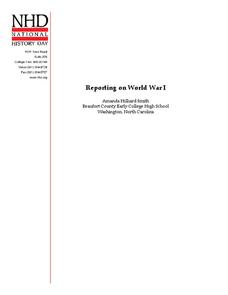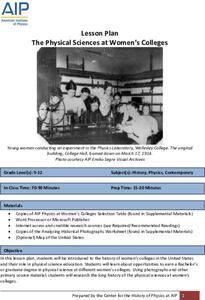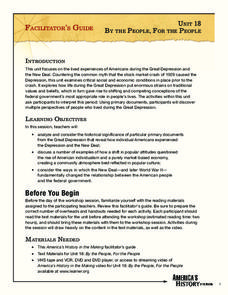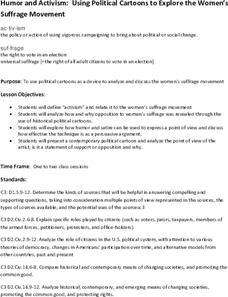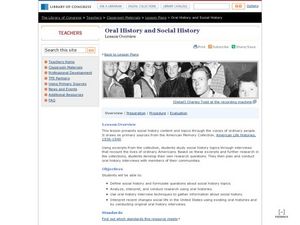Curated OER
Responses to Discrimination During the Civil Rights Period
Students examine the effects of discrimination. In this American Civil Rights Movement lesson, students participate in a classroom activity that requires them to personally feel the effects of discrimination. Students then explore...
Curated OER
Latinos and the Fourteenth Amendment: A Primary Source Document Activity
Eighth graders explore the effect of the Fourteenth Amendment. In this US History lesson, 8th graders read and analyze primary source documents. Students write a three minute paper demonstrating their understanding of the fourteenth...
National History Day
Reporting on World War I
Throughout history, newspapers have reported the events of the day as they unfolded. Using primary and secondary sources from World War I, scholars uncover how the American people learned of the events of the War to End All Wars. History...
DocsTeach
Oh Freedom! Sought Under the Fugitive Slave Act
Using the harrowing story of the Crafts, a couple enslaved in the South who escaped to freedom, young historians trace the story of the Fugitive Slave Act. After examining documents, including affidavits and arrest warrants for the...
Curated OER
Abigail’s War: The American Revolution through the Eyes of Abigail Adams
Four lessons, performed over four weeks, pay special attention to Abigail Adams. Fifth graders analyze primary and secondary sources, read texts, discuss and write about Adams' experience during the Revolutionary War—the Battle of Bunker...
DocsTeach
Juneteenth General Order
While Juneteenth was more than 150 years ago, today Americans debate whether it should be a national holiday. Using a military declaration proclaiming the last of the enslaved people in Texas free, individuals look at the significance of...
American Institute of Physics
The Physical Sciences at Women's Colleges
After a brief introduction to the history of women's colleges in the United States and a discussion of the resistance such institutions faced, young scientists investigate seven traditionally women's colleges and their physics programs....
Annenberg Foundation
By the People, For the People
A picture speaks a thousand words—no matter how old. The 18th installment of a 22-part series on the making of American history has scholars research the causes of the Great Depression and the factors of the New Deal. Using photographic...
National Woman's History Museum
Humor and Activism
As part of their study of the women's suffrage movement, groups analyze political cartoons and drawings. They create a caption for an image from the time, add an exhibit label that provides a context for their drawing, and post as part...
Society of Petroleum Engineers
Renewable and Nonrenewable Energy
Energize an environmental science unit on natural resources with this collection of instructional materials. From simple coloring sheets for primary grade children, to guiding questions for a high school research report, a wide variety...
National Endowment for the Humanities
Edgar Allan Poe, Ambrose Bierce, and the Unreliable Narrator
Stories by Edgar Allan Poe and Ambrose Bierce provide readers with an opportunity to investigate unreliable narrators. The lesson plan begins with an activity about different types of point of view and continues as scholars apply their...
National Constitution Center
Town Hall Wall: College Exam
The college that directly affects young citizens' lives is not the university they're applying to. Learn about the Electoral College in a town hall activity in which class members debate the merits of the current system versus electing a...
Teaching Tolerance
Dismantling Racial Caste
It's time to end racism. The final installment of the series encourages scholars to consider what is needed to ended the racial caste system in the U.S. Young historians complete group discussion, written prompt, and a hands-on-activity...
Library of Congress
Oral History and Social History
Students examine the Great Depression. In this oral and social histories instructional activity, students analyze primary sources to develop an understanding of the America in the 1930's.
Roy Rosenzweig Center for History and New Media
The Boston Massacre: You Be the Judge!
The importance of considering multiple perspectives of the same event is the big idea in this exercise that focuses on the Boston Massacre. Class groups examine photos of four depictions of the massacre, an English and an American...
Curated OER
Using Rock as Primary Source Material
Students listen to a song which functions as an entertaining primary source. It illustrates the part angry, part irreverent anti-war sentiments of the counter-culture in the late 1960s. After hearing the song, students discuss how it...
Concordia College Archives
Introduction and Student Inquiry
Introduce young musicians to the history of and different styles of music with an inquiry-based learning activity that asks them to play detectives to determine the similarities and differences among the sheet music found at a series of...
Curated OER
Trajan's Rome: The Man, The City, The Empire
Incorporate six lessons on Trajan and ancient Rome into a social studies unit on the Roman Empire. From Trajan's birth to his rise to greatness, the resource uses primary source documents and historical commentary to connect learners...
Curated OER
Hear Ye, Hear Ye: Read All About It!
Develop an online newspaper covering the Lewis and Clark Expedition. The class publishes their newspaper on the school's Web site and analyze both primary and secondary sources.
Learning for Justice
The Color of Law: Creating Racially Segregated Communities
It is pointed, powerful, and painful! The first of three lessons about laws and practices that support inequality looks at how government policies created and reinforced segregated communities. Young social scientists read excerpts from...
University of California
The Civil War: Emancipation
Investigate and analyze Abraham Lincoln's Emancipation Proclamation using primary and secondary sources. The sixth installment of an eight-part series analyzes the meaning of Lincoln's document in relation to its impact on the Civil War.
Administrative Office of the US Courts
Nomination Process
"I do solemnly swear that I will support and defend the Constitution of the United States..." Scholars investigate the nomination process of Supreme Court justices when assuming office. Through examination of primary and secondary...
Roy Rosenzweig Center for History and New Media
War and Poetry
A band of brothers or the Devil's agents? Nobel warriors freeing the oppressed or mercenaries working for the military/industrial complex? Groups examine poems from the Civil War, World War I, and World War II to determine the poets'...
Alabama Department of Archives and History
From Alabama Farmer to Civil War Soldier
As part of a study of the Civil War, class members conduct a WebQuest to create a timeline of battles fought by the 10th Alabama Infantry Regimen. They then use Google Earth to pinpoint these battles of the Civil War on a map of Alabama.




